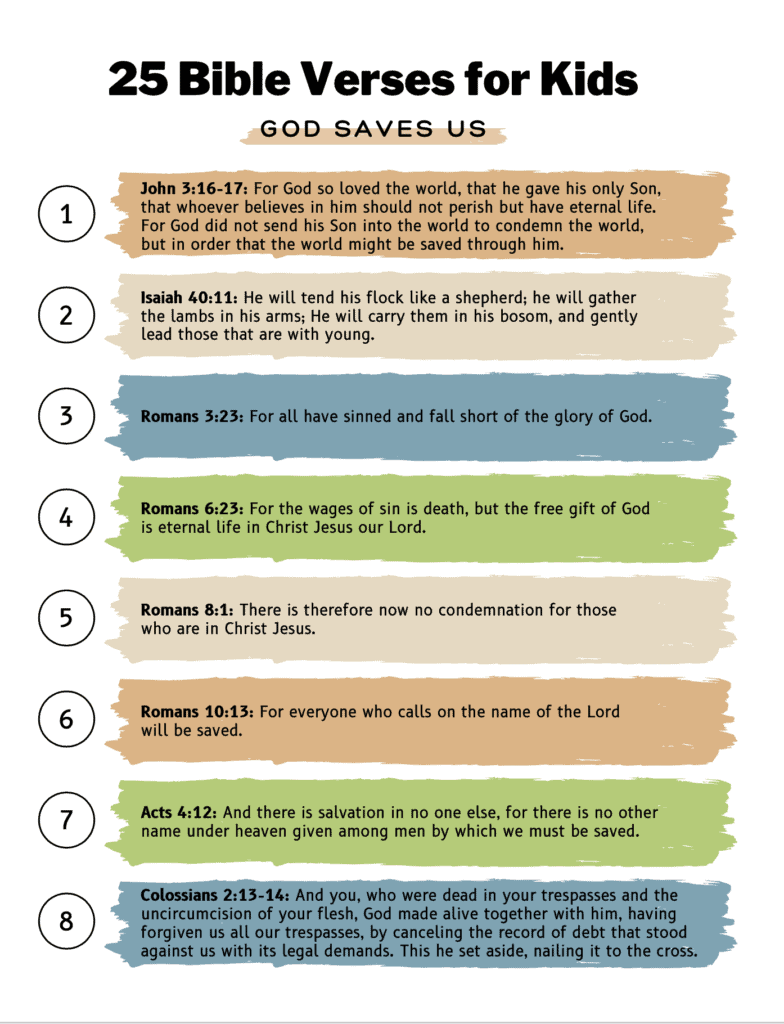
The Secret of Gratitude
The work of Christ in our lives is just plain bigger than our circumstances

Learning Bible verses can feel daunting. How do you start and what verses should you choose? A list of 25 Bible verses for kids to memorize and suggestions on how to make it fun can get you and your family started.
Memorizing Bible verses is so important for kids and adults. The Bible is the inspired and infallible Word of God. It speaks with authority concerning truth, morality, and godly living and is the definitive source of all that we believe. That means the Bible is not just a book. It is divinely inspired, and studying the Bible as a family will change our lives.
Yet, how exactly does one do that? What do we do so that the Bible changes us and changes our children? In the late Dr. Gary Smalley’s book, Change Your Heart, Change Your Life, Dr. Smalley encourages parents to help their families “hide God’s Word in their heart,” as mentioned in Psalm 119:11 (NIV). And like the title of his book suggests, if you change your heart by putting God’s Word in it, you can change your life. Another way to look at it is, how do we store up God’s Word, as the ESV version puts it? A good way to do this is by having kids and parents memorize Bible verses.
I admit I’ve struggled with Bible memory. It’s one thing I say I want to do but often put on the back-burner. So, I’ve looked for tips and tricks to help memorize and meditate on Scripture for both my children and me. First, I’ll share some tips on how to memorize Bible verses. Then we will look at some solid Bible verses for kids to memorize that will start your families’ faith journey.
An example of this is to look at John 3:16-17. A parent could break it down to God loves us. Or simply, Jesus saves us. The point is to make it understandable. Make it a song. Add a simple melody such as “God loves us. God loves who? God loves you, and you, and you.” And as you are saying, “you, and you, and you” point to them (or better yet, tickle them) and point to yourself and point to anyone else in the vicinity. Repeat this often and in different locations.
When working through verses, see if your child has a preferred style of learning. Do they lean towards listening? Then check out Bible apps, audiobooks, and Adventures in Odyssey. Or, if they are kinesthetic learners, see if they want to act out the Scripture. For example, create a small play on what it means to be kind to each other, as shared in Ephesians 4:32. Each time they show an act of kindness, they and the audience will say the verse.
Or maybe they want to build a memorial to help them remember. Build a flashlight out of Legos, K’nex, or just add batteries to a regular flashlight when working on the verse Psalm 119:105. Have a treasure hunt with the flashlight and offer a sweet treat at the end after each kid has memorized the Bible verse. In other words, help make abstract concepts understandable and have fun doing it!
As children move into their tween and teen years, help them understand the verses they have learned. What does it mean, and why is it helpful? For example, ask about forgiveness (see Psalm 103:12). Why does God forgive us? And why does God ask us to forgive others? In Matthew 6:14-15, why is an offense called a trespass? And what does popular psychology have to say about the importance of forgiveness? What can that tell us? And please know, no parent has all the answers. You can look up the answers together, ask a pastor, do an Internet search, or find great books to assist. Looking for a solution is a helpful life skill to teach your tween and teen.
Also, another way to engage a teenager is by creating with Scripture. As they are working on a verse, what can they create? I know one teen who makes necklaces for all her friends with a verse she chooses. Or teens can put together a video that the whole family watches and then post it on their favorite social media. What about creating artwork? Drawing, painting, or coloring a verse may resonate with your artistic tween or teen.
In conclusion, there are a million ways to engage with memorizing Scripture. Whether you are memorizing Bible verses with your kids or learning how to read the Bible as a family, the most important thing to do is make God and His Word a part of your everyday life. As shared in Deuteronomy 6:7-9, we want to be teaching and talking and using Scripture all the time in our lives. Memorizing is only useful if we live out what we learned. By using Bible verses in our daily lives, we will demonstrate powerfully to our children that God’s Word is the source of truth. I like the slogan that Bring Your Bible to School shares regarding God’s Word: Learn it, Live it, Love it!
These verses are just a few of many great verses. Let them be an appetizer for your family. Later, dig deeper into the Word of God and go for the three-course meal of your choosing. This is only the beginning of storing God’s word in your heart.

These 25 Bible verses for kids are a great start to helping your children hide God’s word in their hearts. I hope they are a blessing to your family as you learn it, live it, love it!